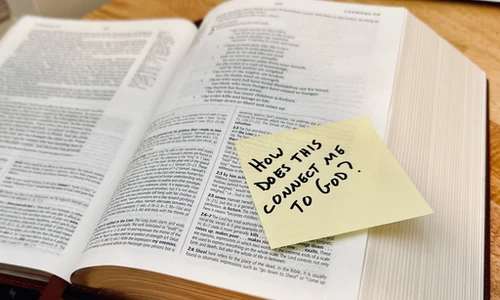And when the feast was ended, as they were returning, the boy Jesus stayed behind in Jerusalem. His parents did not know it, but supposing him to be in the group they went a day’s journey, but then they began to search for him among their relatives and acquaintances, and when they did not find him, they returned to Jerusalem, searching for him.
Let’s play, “who told this story?”
There are dozens of choices, I guess, depending on how many folks were in the party traveling with Joseph and Mary.
But even Luke seems unlikely to have run into those people to interview them twenty-one years later.
So we are down to three: Joseph, Mary, and Jesus Himself. And His siblings, I suppose; we’ll get back to them.
We have no way to decide, but you all know I love wondering anyway.
This is a weird story for several reasons, but in particular, it apparently only happened once that Jesus did something unexpected as a boy that demonstrated that His relationship with God and His wisdom in the Scriptures were unparalleled. This singularity makes me think that either Luke picked one example out of a host of stories, or whomever Luke was talking to did the same thing.
The apostles don’t seem likely to have heard a lot of stories about Jesus’s youth during His ministry. Jesus wasn’t one to brag on Himself, and this little vignette doesn’t seem to have theological importance but instead gives insight into who Jesus was as a man. Or boy.
Which leaves Jesus’s parents. But we don’t see much of His parents after His ministry begins, even though He almost certainly still interacted with them, even after He moved to Capernaum. Obviously the apostles knew them (Luke 8:19–21), but any time Jesus is around people, it’s His disciples and their families for the most part.
In addition, we don’t see Joseph at all after this story. He was undeniably important in Jesus’s life, and he would have apprenticed Jesus into the carpentry/masonry trade. But because we don’t see him much, we can make an educated guess that he died some time in the eighteen years between this story and the beginning of Jesus’s ministry.
Mary, on the other hand, is around a lot. Wherever Jesus goes, there seems to be a group of dedicated women following Him the way the apostles do, but just off-camera most of the time. Mary is probably one of them. If your son were the Son of God, and an angel had visited you and given you that prophecy, and you had responded as gloriously as Mary did, you’d be sure to be with Him, too.
So I’m guessing that Jesus didn’t tell the story, because it’s a bit too personal, and Joseph didn’t tell it, because he was dead by that point.
That mostly leaves Mary.
Okay, so when did the story get told? Let me cut to the chase to my favored scenario1.
When someone you love dies, what happens? After the immediate visceral grief and grieving; after the terrible flurry of logistics that rips at your mourning mind with its callous, relentless need; after the prayers and the sermons and the funeral. What happens?
In a perfect world, and often even in this imperfect one, the family and the friends of the deceased gather together in shared mourning, and they eat, and they tell stories. They tell stories of life, of joy, stories that uniquely remind them of their mother or brother or friend. They share these stories to keep that person alive in their minds and the minds of their friends. They share stories to comfort each other, because that’s what we do as humans—we tell stories.
Well, in Acts 1, after Jesus dies, is resurrected, and ascends into Heaven, a huge group of proto-Christians2 huddled together in fear and prayer in the upper room of a house (Acts 1:14).
And what do you think they did? They were terrified that they would be found and crucified. Despite Jesus’s assurances and commands, they were huddled together because they were scared. And even though Jesus wasn’t dead, He also wasn’t with them any more, and they were surely in mourning. Although it was probably the most confused mourning the world has ever witnessed: mourning someone who is more alive than anyone has ever been in the history of eternity.
So once the gripping, paralyzing fear had softened a little, and the prayers had begun, at some point, there’s a lull. James sits back against a cushion with a glass of wine and a piece of bread, and he says, “Hey, do you guys remember when He told that story about the mustard seed, and we all just kind of stared like He was crazy?”
The whole room is incredulous. James is joking about the dead and risen Savior, their friend and master and son and brother and Lord.
But then James’s brother John speaks up, and says, “Yeah, man, that happened a lot. What about the one where a sower went out to sow? He had to explain that like three or four times before I had any idea what He was talking about. I’m not sure I could explain it to someone now, although I guess I’ll have to learn.”
Everybody kind of laughs nervously, glancing surreptitiously at Mary to see if she’s going to start crying again, and the room is silent.
Until Mary speaks up, and she says, quietly, “Do you all know about the very first time He showed off? I mean in public. Obviously we knew He was special since the angel”—her voice breaks, remembering the annunciation3—”since Gabriel visited me. But there was—I mean, we were at a wedding. And they had run out… I can’t believe I’m telling this story; it sounds ridiculous after everything we’ve seen… they had run out of wine.”
She tells the whole story of the wedding at Cana (John 2:1–11). People relax. Some are even willing to laugh. More stories get passed around by the ones who were there. They talk about the miracles, they talk about the parables, they talk about the incredibly long walks and the storms on the lake and the pigs and the figs and Capernaum and Galilee and Jairus and Lazarus.
And somewhere in the mix, Jesus’s brother James speaks up—I told you we’d get back to him—and he says, “Mom, do you remember way back when we were kids, and we had gone up to Jerusalem, just right here, for Passover? I was young, like nine or ten maybe, and we had come up for the feast. And we were going home, and we looked around, and Jesus wasn’t even with us?”
One of his sisters breaks in: “Yeah, we spent hours searching the whole caravan for him, and you and Dad made every last one of us turn around and go back to Jerusalem to find him, and it took us days and days, but we did, finally, in the temple, of all places, and He just looks at us and goes, ‘Well, where did you expect me to be?’ Y’all, Mom’s face got so dark, I thought for a moment she was going to kill Him on the spot. But she didn’t, she relaxed, she just told Him it was time to go home, and He came right along with us like it was no big deal. Sigh I would never have gotten away with that.”
“Yes, well, you were eight, and a woman, and Jesus… Jesus was special from the moment He was conceived. Did I ever tell the rest of you about the time I visited my cousin Elizabeth while we were both pregnant…?”
And on and on and on. Oh, to have been there!
We are humans, and we tell stories. We especially tell stories about people we love. And in a desperate move to cling to a bit more life, we tell stories of our beloved dead. Who was more beloved than Jesus? And who needed more comfort than His followers, 120 of them cramped together in that room, precariously balanced between an ironclad past of law and tabernacle and an eternal future of life and salvation?
So I bet they told and retold every story they could remember of Jesus’s life. They talked over each other, they corrected each other, they asked questions and tried to puzzle out pieces they didn’t yet understand. They practiced, although they didn’t quite know it yet, the earliest Christian evangelism.
And somewhere in that glorious, fearful, confused time, someone told this story of Jesus as a boy. And they remembered. So when Luke came along to learn about Jesus, this was one of the stories they told him. And the Spirit—eternally present with Jesus, infinitely closer than His mother or brothers or friends or disciples—pushed on Luke’s heart, and said, “That’s a good one. Write that down.”
-
We are now entering what I like to call the “Gospel of Jerry.” Almost all of this story is speculative; please don’t think I believe it’s true the way the Bible is true. ↩
-
“Proto” only because of what happens in Acts 2 at Pentecost that completes their baptism into the body of Christ. ↩
-
A fancy word that just refers to when Gabriel first told Mary about Jesus in Luke 1:26–38. ↩



